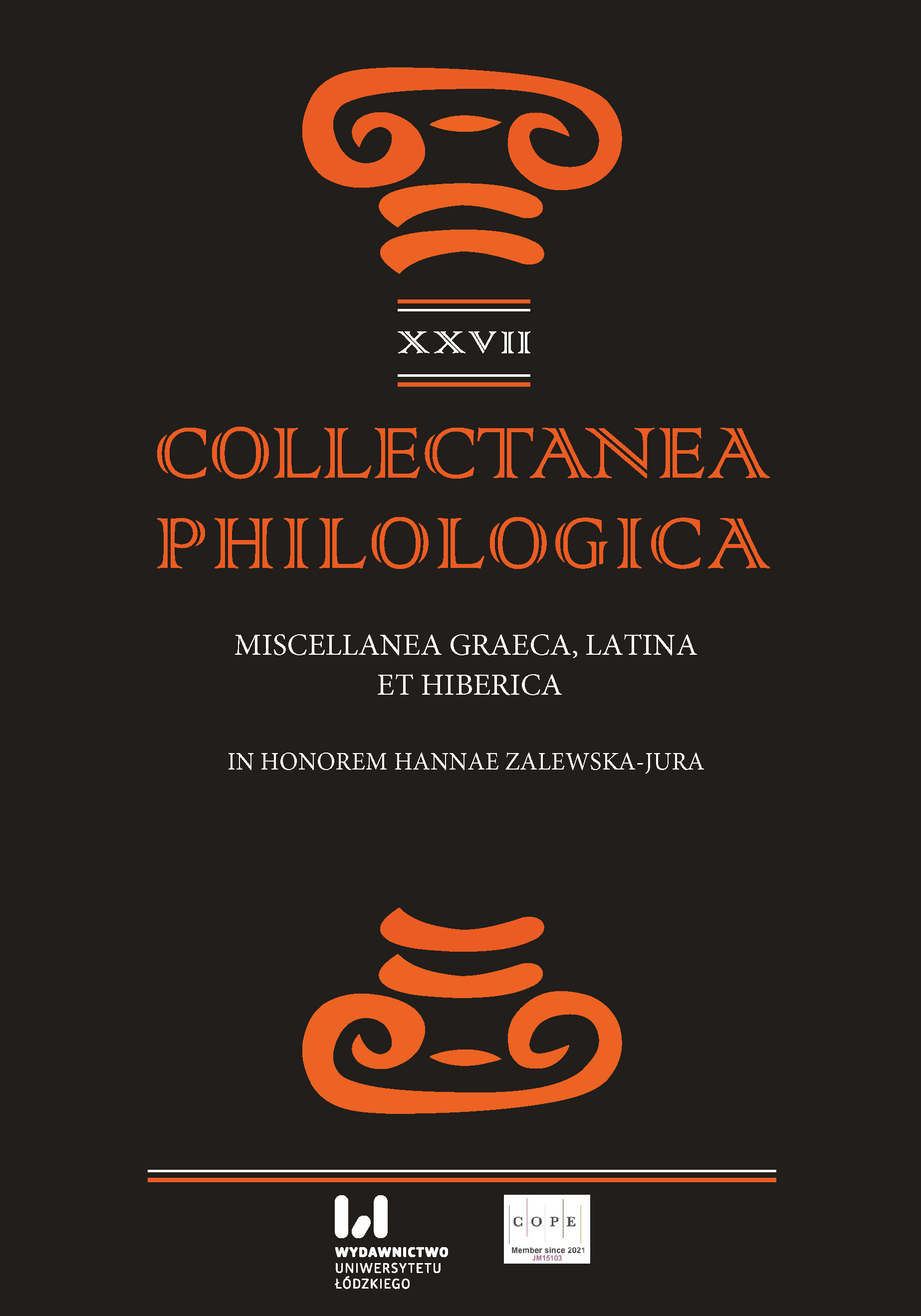Hiszpańskie korzenie rodu Teodozjusza w poezji Klaudiana
DOI:
https://doi.org/10.18778/1733-0319.27.14Słowa kluczowe:
Klaudian, Hiszpania rzymska, dynastia teodozjańska, SerenaAbstrakt
Theodosius the Great was one of the great Romans of Iberian origin. The poetry of Claudian, the court poet of his son, Honorius, is full of praise for the Theodosian dynasty, hence one can find there also references to Spain as the cradle of the ruling house. The poet praised not only the emperors, but also referred to other members of the dynasty, in particular to Serena, Theodosius’ adoptive daughter and Stilicho’s wife. The commendation of the honorand’s country of origin was an important part of ancient panegyrics and Claudian mentioned Spain several times in this context. Such references are rather vague and general, frequently touching the aquatic environment an only once, in Laus Serenae, make up a longer passage belonging to the subgenre of laudes. The poet underlined also the relation (suggesting the fictive genealogy) between the Theodosian dynasty and the earlier emperors of Iberian origin, i.e. Trajan and Hadrian. By dint of the aforementioned passages Claudian tried to strengthen the position of Theodosians, to date known rather from their activities in the East, and to emphasize their connections with the Western Empire.
Bibliografia
Antczak, K. (2016). Obraz Hiszpanii w Historii naturalnej Pliniusza Starszego. Poznań: Wydawnictwo PTPN; Gniezno: Instytut Kultury Europejskiej UAM.
Google Scholar
Babnis, T. (2021). Once Again on Claudian’s Egyptian Origin. Classica Cracoviensia 24. 9–26. https://doi.org/10.12797/CC.24.2021.24.01
Google Scholar
DOI: https://doi.org/10.12797/CC.24.2021.24.01
Bureau, B. (2008). Nobiliora tenent animos exempla pudicos. Idéal féminin et idéal poétique dans la Laus Serenae de Claudien. In: J.M. Fontanier (ed.). Amor Romanus. Amours romaines. Etudes et anthologie. Rennes: Presses Universitaires de Rennes. 205–226. https://doi.org/10.4000/books.pur.30495
Google Scholar
DOI: https://doi.org/10.4000/books.pur.30495
Busch, K. (2015). Die Frauen der theodosianischen Dynastie. Macht und Repräsentation kaiserlicher Frauen im 5. Jahrhundert. Stuttgart: Franz Steiner Verlag. https://doi.org/10.25162/9783515110501
Google Scholar
DOI: https://doi.org/10.25162/9783515110501
Cameron, A. (1970). Claudian. Poetry and Propaganda at the Court of Honorius. Oxford: Oxford University Press.
Google Scholar
Christiansen, P.G. (1988). Concordantia in Claudianum. A Concordance to Claudianus. Hildesheim–Zürich–New York: Olms-Weidmann.
Google Scholar
Coombe, C. (2018). Claudian the Poet. Cambridge: Cambridge University Press. https://doi.org/10.1017/9781107415645
Google Scholar
DOI: https://doi.org/10.1017/9781107415645
Demandt, A. (1969). Der Tod des älteren Theodosius. Historia: Zeitschrift für Alte Geschichte 18/5. 598–626.
Google Scholar
Doyle, Ch. (2019). Honorius. The Fight for the Roman West AD 395–423. London–New York: Routledge. https://doi.org/10.4324/9781315640792
Google Scholar
DOI: https://doi.org/10.4324/9781315640792
Döpp, S. (1980). Zeitgeschichte in Dichtungen Claudians. Wiesbaden: Franz Steiner Verlag.
Google Scholar
Frings, U. (1975). Claudius Claudianus. Epithalamium de nuptiis Honorii Augusti. Einleitung und Kommentar. Meisenheim am Glan: Verlag Anton Hain.
Google Scholar
Fuoco, O. (2013). Claudio Claudiano. Fescennina dicta Honorio Augusto et Mariae. Bari: Cacucci.
Google Scholar
Gillett, A. (2012). Epic Panegyric and Political Communication in the Fifth-Century West. In: L. Grig, G. Kelly (eds.). Two Romes. Rome and Constantinople in Late Antiquity. Oxford: Oxford University Press. 265–290. https://doi.org/10.1093/acprof:oso/9780199739400.003.0012
Google Scholar
DOI: https://doi.org/10.1093/acprof:oso/9780199739400.003.0012
Guipponi-Gineste, M.-F. (2010). Claudien. Poète du monde à la cour d’Occident. Paris: De Boccard. https://doi.org/10.2307/j.ctv327fwbg
Google Scholar
DOI: https://doi.org/10.2307/j.ctv327fwbg
Horstmann, S. (2004). Das Epithalamium in der lateinischen Literatur der Spätantike. München–Leipzig: K.G. Saur.
Google Scholar
DOI: https://doi.org/10.1515/9783110956528
Kelly, G. (2013). The Political Crisis of AD 375–376. Chiron 43. 357–410.
Google Scholar
Lehner, J. (1984). Poesie und Politik in Claudians Panegyrikus auf das vierte Konsulat des Kaisers Honorius. Ein Kommentar. Königstein: Verlag Anton Hain.
Google Scholar
MacCormack, S. (1976). Latin Prose Panegyrics. Tradition and Discontinuity in the Later Roman Empire. Revue d’Etudes Augustiniennes et Patristiques 22/1–2. 29–77. https://doi.org/10.1484/J.REA.5.104309
Google Scholar
DOI: https://doi.org/10.1484/J.REA.5.104309
Matthews, J. (1975). Western Aristocracies and Imperial Court, A.D. 364–425. Oxford: Clarendon Press.
Google Scholar
McEvoy, M. (2013). Child Emperor Rule in the Late Roman West, AD 367–455. Oxford: Oxford University Press. https://doi.org/10.1093/acprof:oso/9780199664818.001.0001
Google Scholar
DOI: https://doi.org/10.1093/acprof:oso/9780199664818.001.0001
McLynn, N. (2005). ‘Genere Hispanus’: Theodosius, Spain and Nicene Orthodoxy. In: K. Bowers, M. Kulikowski (eds.). Hispania in Late Antiquity. Current Perspectives. Leiden–Boston: Brill. 77–120. https://doi.org/10.1163/9789047407522_009
Google Scholar
DOI: https://doi.org/10.1163/9789047407522_009
Pappas, V. (2022). The Poetics of Honorius Romantic Behaviour in Claudian’s Epith. 1–46. Studia Philologica Valentina 24. 111–134. https://doi.org/10.7203/SPhV.24.24370
Google Scholar
DOI: https://doi.org/10.7203/SPhV.24.24370
Petry, M. (2018). Klaudiusz Klaudian: ‘De tertio consulatu Honorii Augusti’, ‘De quarto consulatu Honorii Augusti’. Wstęp, przekład i komentarz. Praca doktorska. Uniwersytet Adama Mickiewicza w Poznaniu.
Google Scholar
Ricci, M.L. (2001). Claudii Claudiani Carmina Minora. Introduzione, traduzione e commento. Bari: Edipuglia.
Google Scholar
Schindler, C. (2009). Per carmina laudes. Untersuchungen zur spätantiken Verspanegyrik von Claudian bis Coripp. Berlin–New York: De Gruyter. https://doi.org/10.1515/9783110210583
Google Scholar
DOI: https://doi.org/10.1515/9783110210583
Sigayret, L. (2009). L’imaginaire de la guerre et de l’amour chez Claudien. Paris: L’Harmattan.
Google Scholar
Szelest, H. (1977). Klaudians „Laus Serenae”. Eos 65. 257–263.
Google Scholar
Tournier, Ch. (2016). La mémoire des figures impériales chez Claudien. Interférences. Ars scribendi 9. 1–45. https://doi.org/10.4000/interferences.5830
Google Scholar
DOI: https://doi.org/10.4000/interferences.5830
Ware, C. (2012). Claudian and the Roman Epic Tradition. Cambridge: Cambridge University Press. https://doi.org/10.1017/CBO9781139004152
Google Scholar
DOI: https://doi.org/10.1017/CBO9781139004152
Wasdin, K. (2014). Honorius Triumphant. Poetry and Politics in Claudian’s Wedding Poems. Classical Philology 109(1). 48–65. https://doi.org/10.1086/673850
Google Scholar
DOI: https://doi.org/10.1086/673850
Williams, S., Friell, G. (2016). Teodozjusz Wielki. Przeł. J. Baranowski. Oświęcim: Napoleon V.
Google Scholar
Opublikowane
Wersje
- 2024-10-30 - (2)
- 2024-10-30 - (1)
Jak cytować
Numer
Dział
Licencja

Utwór dostępny jest na licencji Creative Commons Uznanie autorstwa – Użycie niekomercyjne – Bez utworów zależnych 4.0 Międzynarodowe.












